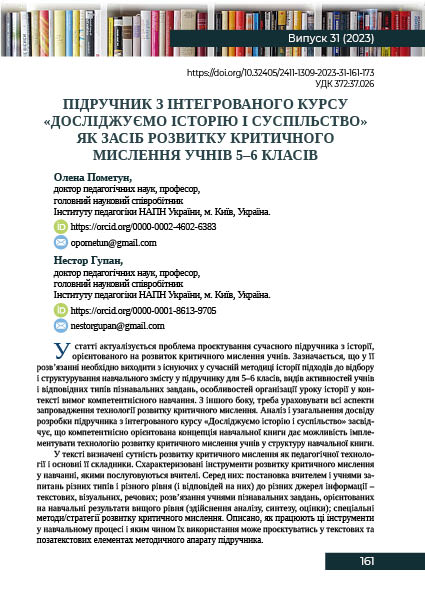Textbook for the Integrated Course “Exploring History and Society” as a Method for Development of Critical Thinking in 6th and 5th Grade Students

Published 2024-01-17
Keywords
- history and civic education,
- integration,
- textbook,
- critical thinking,
- development
How to Cite

This work is licensed under a Creative Commons Attribution-NonCommercial-ShareAlike 4.0 International License.
Abstract
This article addresses the issue of designing a modern history textbook aimed at fostering the development of critical thinking in students. It is noted that the solution to this problem should consider existing approaches in contemporary methodology history for selecting and structuring educational content for 5–6 grade textbooks, types of student activities, corresponding cognitive tasks, and the organization of history lessons within the context of competency-based education. On the other hand, all aspects of implementing critical thinking development technology must be considered. The analysis and synthesis of experience in developing a textbook for the integrated course “Exploring History and Society” confirms that a competency-oriented concept of the textbook allows for the incorporation of critical thinking development technology into the textbook’s structure. The text defines the essence and basic components of the pedagogical technology for developing critical thinking. It characterizes the tools for fostering critical thinking in education used by teachers, including the formulation of questions of various types and levels by both teachers and students (and answers to them) regarding various sources of information: textual, visual, and verbal. Additionally, it describes students’ resolution of cognitive tasks aimed at achieving higher-level learning outcomes (analysis, synthesis, evaluation) and special methods/ strategies for developing critical thinking. The text explains how these tools work in the educational process and how their use can be projected into the textual and extra-textual elements of the textbook’s methodological apparatus. It is demonstrated that such implementation enriches the methodological apparatus of the textbook, enabling teachers to organize students’ active learning diversely and effectively, consciously monitor the growth of students’ critical thinking, and systematically enhance the quality of the educational process.
Downloads
References
- Буринська, Н. М. (2003). Особистісно зорієнтоване навчання як провідна дидактична функція сучасного підручника. Проблеми сучасного підручника: зб. наук. праць, 4. 7‒10.
- Головко, М. В. (2018). Підручник як основа методичної системи компетентнісно орієнтовано-го навчання фізики в гімназії. Проблеми сучасного підручника: зб. наук. праць, 20, 62–74. https://ipvid.org.ua/index.php/psp/article/view/211
- Гринюк, О. С. (2016). Шкільний підручник з природознавства як засіб інтеграції знань та формування дослідницьких умінь старшокласників. Проблеми сучасного підручника: зб. наук. праць, 16, 92–99.
- Державний стандарт базової середньої освіти (2020). Постанова КМУ № 898 від 30.09.2020 року. https://osvita.ua/legislation/Ser_osv/76886
- Засєкіна, Т. М. (2018). До концепції підручника інтегрованого курсу «Природничі науки». Проблеми сучасного підручника. 20, 111‒126. http://nbuv.gov.ua/UJRN/ psp_2018_20_12
- Кодлюк, Я. П. (2014). Концептуальні основи побудови підручника для початкової школи. Проблеми сучасного підручника: зб. наук. праць,14, 284‒292. http:// nbuv.gov.ua/UJRN/psp_2014_14_34
- Кроуфорд, А. (2006) Технології розвитку критичного мислення учнів. Київ: Плеяди.
- Малієнко, Ю. Б. (2016). Формування історичної компетентності засобами підручника з історії середніх віків. Проблеми сучасного підручника: зб. наук. праць, 16, 203–212.
- Нова українська школа. (2017). Концептуальні засади реформування середньої школи. https://mon.gov.ua/storage/app/media/zagalna%20serednya/nova-ukrainskashkola-compressed.pdf
- Пометун, О., Малієнко, Ю., Ремех, Т. (2022). Досліджуємо історію і суспільство. Підручник інтегрованого курсу для 5 класу закладів заг.сер.освіти. Київ: Видавничий дім «Освіта». https://pidruchnyk.com.ua/1675-_doslid_istoriyi_pometun.html
- Пометун, О., Ремех, Т. (2023) Досліджуємо історію і суспільство. Підручник інтегрованого курсу для 6 класу закладів заг.сер.освіти. Київ: Видавничий дім «Освіта».
- Пометун, О.І., Гупан, Н.М. (2021а). Відкриті та закриті питання розвитку критичного мислення учнів на уроках історії. Матеріали І Міжнародної науково-практичної конференції «Теорія і практика науки: ключові аспекти» (19-20.02.2021, Рим, Італія),42, 385‒393. https://lib.iitta.gov.ua/724335/
- Пометун, О.І., Гупан, Н.М. (2021b). Методика розвитку критичного мислення ліцеїстів на уроках історії: посібник. Київ: КОНВІ ПРІНТ. https://lib.iitta.gov.ua/729252/
- Пометун, О. І., Гупан, Н.М. (2014). Проектування шкільного підручника: вимоги і проблеми. Проблеми сучасного підручника: зб. наук. праць. 14, 564–573.
- Пометун, О. І., Гупан, Н.М. (2021с). Розробка підручника з інтегрованого курсу історії та громадянства навчання для 5 класу. Проблеми сучасного підручника: зб. наук. праць. 27, 182‒194. https://lib.iitta.gov.ua/729478/
- Пометун, О.І., Гупан, Н.М. (2019). Таксономія Б. Блума і розвиток критичного мислення школярів на уроках історії. Український педагогічний журнал, 3, 50‒57. https://lib.iitta.gov.ua/717917/
- Пометун, О. І. (2018). Критичне мислення як педагогічний феномен. Український педагогічний журнал, 2, 89‒98.
- Томчук, М. (2011). Методологічні засади створення сучасного шкільного підручника. Психологія і суспільство. 4, 124–128.
- Топузов, О. М. (2012). Роль і місце підручника в реалізації компетентнісного підходу до навчання. Проблеми сучасного підручника: зб. наук. праць. 12, 241–247.
- Топузов, О.М., Вяткіна, О.Б. (ред). (2016). Експертиза шкільних підручників: інструктивно-методичні матеріали для експертизи електронних версій проєктів підручників для учнів 8 класу загальноосвітніх навчальних закладів. Київ: Педагогічна думка, 5‒15.
- Bloom B.S. and Krathwohl D. R. (1956) Taxonomy of Educational Objectives: The Classification of Educational Goals, by a committee of college and university examiners. Handbook I: Cognitive Domain. NY, NY: Longmans, Green.
- Paul, Richard W. (1990) Critical Thinking: What Every Person Needs to Survive in a Rapidly Changing World. Rohnert Park, CA: Center for Critical Thinking and Moral Critique, Sonoma State University.
